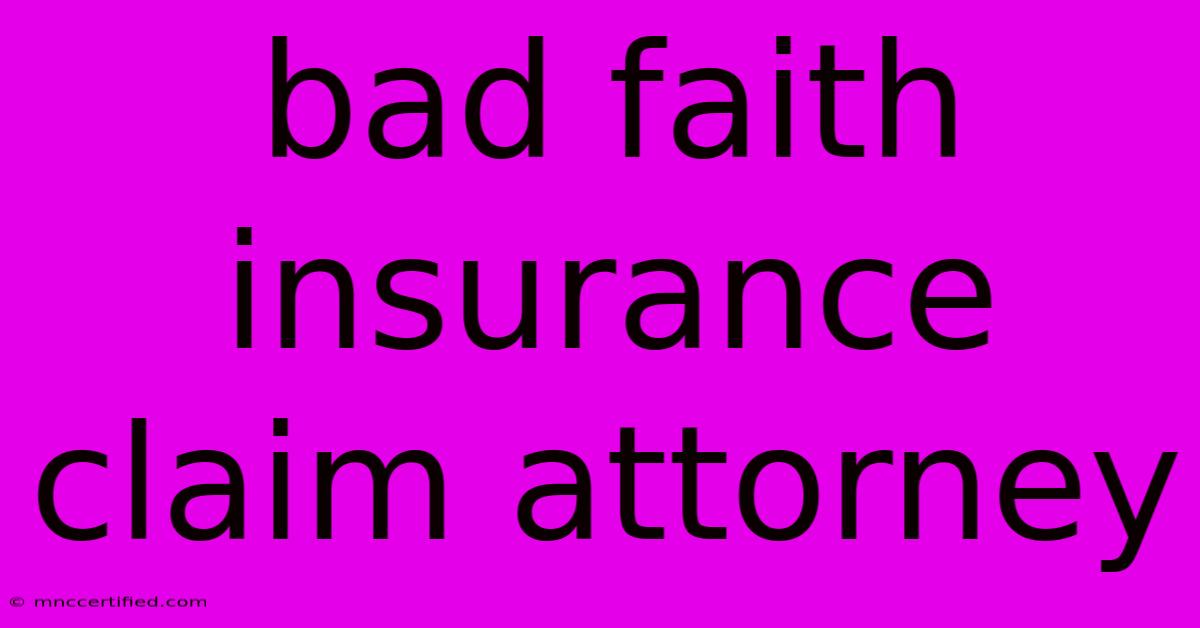Bad Faith Insurance Claim Attorney

Table of Contents
Navigating the Labyrinth: How a Bad Faith Insurance Claim Attorney Can Help
Dealing with an insurance company after an accident or loss can be stressful enough. But when your claim is unjustly denied or delayed, it can feel like you're fighting a losing battle. This is where understanding bad faith insurance claims and the crucial role of a bad faith insurance claim attorney becomes paramount. This article will illuminate the complexities of bad faith insurance practices and guide you toward securing the legal representation you deserve.
What Constitutes Bad Faith Insurance Practices?
Insurance companies have a contractual obligation to act in good faith when handling claims. Bad faith occurs when an insurer knowingly fails to fulfill this obligation, breaching their duty to their policyholders. This can manifest in various ways, including:
- Unreasonable Delay in Claim Processing: Prolonged delays without justification, often involving endless requests for documentation or unnecessary stalling tactics.
- Unjustified Denial of a Valid Claim: Refusing to pay a legitimate claim based on flimsy or fabricated reasons.
- Failure to Investigate Claims Thoroughly: Neglecting to properly investigate the circumstances surrounding the claim or failing to gather crucial evidence.
- Lowball Settlement Offers: Offering significantly less than the actual value of the claim, pressuring the policyholder to accept an inadequate settlement.
- Misrepresentation or Concealment of Information: Providing misleading information or withholding crucial facts that could affect the claim's outcome.
- Failure to Communicate Effectively: Ignoring communication attempts, providing inconsistent information, or failing to keep the policyholder updated on the claim's progress.
These actions can leave policyholders facing significant financial hardship and emotional distress. It's crucial to understand that these aren't just inconveniences; they are potential violations of your legal rights.
Identifying the Need for a Bad Faith Insurance Claim Attorney
If you suspect your insurance company is engaging in bad faith practices, seeking legal counsel is crucial. Consider these warning signs:
- Repeated Delays without Explanation: Your claim has been pending for an unreasonably long time without any clear explanation.
- Unreasonable Requests for Documentation: The insurer keeps requesting excessive or irrelevant documentation, hindering the claim's progress.
- Unjustified Claim Denial: The insurer denied your claim without providing substantial evidence or justification.
- Lowball Settlement Offer: The proposed settlement is significantly lower than the actual damages you've suffered.
- Lack of Communication: The insurer is unresponsive to your attempts to communicate or provides inconsistent information.
A bad faith insurance claim attorney specializes in navigating the intricacies of insurance law and can help you build a strong case against the insurer.
The Expertise of a Bad Faith Attorney
A seasoned bad faith attorney possesses in-depth knowledge of:
- Insurance Law: Understanding the specific legal requirements and regulations governing insurance contracts and claims.
- Evidence Gathering: Collecting and analyzing evidence to support your claim, including medical records, police reports, and expert testimony.
- Negotiation and Litigation: Skilled in negotiating fair settlements and representing clients in court if necessary.
- Damages Calculation: Accurately assessing the full extent of your losses, including medical expenses, lost wages, pain and suffering, and emotional distress.
How a Bad Faith Insurance Claim Attorney Can Help You
A dedicated bad faith insurance claim lawyer will:
- Investigate Your Claim: Thoroughly examine the details of your case, identifying any potential instances of bad faith.
- Communicate with the Insurer: Act as your advocate, communicating with the insurer on your behalf and demanding fair treatment.
- Negotiate a Fair Settlement: Work towards securing a settlement that adequately compensates you for your losses.
- Represent You in Court: If a settlement can't be reached, they'll prepare and present your case in court.
- Maximize Your Recovery: Strive to obtain the highest possible compensation for your damages.
Choosing the right attorney is essential. Look for someone with a proven track record of success in handling bad faith insurance claims.
Conclusion: Protecting Your Rights
Facing bad faith insurance practices can be a daunting experience. However, by understanding your rights and seeking the assistance of a qualified bad faith insurance claim attorney, you can significantly increase your chances of obtaining the fair compensation you deserve. Don't hesitate to seek legal counsel if you suspect your insurance company is acting in bad faith – your rights are worth protecting. Remember to conduct thorough research and choose a lawyer specializing in this area of law for optimal results. Taking proactive steps now can prevent further stress and financial burdens down the line.

Thank you for visiting our website wich cover about Bad Faith Insurance Claim Attorney. We hope the information provided has been useful to you. Feel free to contact us if you have any questions or need further assistance. See you next time and dont miss to bookmark.
Featured Posts
-
Redfords Career Billy Bobs View
Nov 16, 2024
-
49ers Bills Game Thrive City Watch Party
Nov 16, 2024
-
Homeowners Insurance Lubbock Texas
Nov 16, 2024
-
Gmac Insurance Claims Phone Number
Nov 16, 2024
-
Insurance For Concrete Contractors
Nov 16, 2024